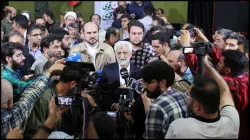Iran holds run-off elections as reformist lawmaker takes on hardliner to become next President
Hardline candidate Saeed Jalili and moderate candidate Massoud Pezeshkian are competing in the run-off election to become the next President. The elections were called on June 28 after Ebrahim Raisi's death in a helicopter crash in late May.

Tehran: Iranians began voting on Friday in a run-off election to replace the late President Ebrahim Raisi, as the contest narrowed down between a reformist lawmaker and a hardline former negotiator in the way of choosing Supreme Leader Ayatollah Ali Khameini's possible successor. The elections came at a time of high public apathy after years of economic woes, mass protests and tensions in the Middle East.
Voters face a choice between the hard-line former nuclear negotiator Saeed Jalili and Massoud Pezeshkian, a heart surgeon and longtime parliament member who has allied himself with moderates and reformists within Iran's Shiite theocracy. An initial round of voting June 28 saw no candidate get over 50 per cent of the vote, forcing the runoff. It also saw the lowest turnout ever for an Iranian election, leaving turnout Friday a major question.
There have been calls for a boycott, including from imprisoned Nobel Peace Prize laureate Narges Mohammadi, though potential voters in Iran appear to have made the decision not to participate last week on their own as there's no widely accepted opposition movement operating within or outside of the country.
What will happen after the elections?
Iran will appoint a president, but it is unlikely to change the country's policies as all crucial state matters are handled by the Supreme Leader. However, presidents can bend the country's policies toward confrontation or negotiation with the West and set the tone of domestic and foreign policy.
Khamenei cast one of the election's first votes from his residence, with television cameras and photographers showing him dropping the ballot into the box. “I have heard that people's enthusiasm is more than before,“ Khamenei said. “God willing, people vote and choose the best” candidate.
More than 61 million Iranians over the age of 18 are eligible to vote, with about 18 million of them between 18 to 30. Elections are scheduled to end at 6 pm (local time), but traditionally get extended until midnight to boost participation. As has been the case since the 1979 Islamic Revolution, women and those calling for radical change have been barred from the ballot while the vote itself will have no oversight from internationally recognized monitors.
How often are these run-off elections in Iran?
Friday's election marks only Iran's second presidential runoff since 1979. The first came in 2005, when hard-liner Mahmoud Ahmadinejad bested former President Akbar Hashemi Rafsanjani. Under Ahmadinejad, Iran faced international sanctions over its advancing nuclear program, as well as the 2009 Green Movement protests and the crackdown that smashed them.
Jalili, who is considered close to Khamenei and is unknown for his uncompromised hardline stance, is in stark contrast to Pezeshkian's views, who advocates warmer relations with the West, social reform and liberalisation. However, a victory for mild-mannered lawmaker Pezeshkian might help ease tensions with the West and improve chances of economic reform. Although he is faithful to Iran's theocratic rule, Pezeshkian is backed by the reformist faction that has largely been sidelined in Iran in recent years.
With more than 25 million votes counted on Saturday, moderate lawmaker Massoud Pezeshkian won over 10 million votes ahead of hardline diplomat Saeed Jalili with over 9.4 million votes, according to provisional results released by the ministry. Neither of the candidates managed to secure 50 per cent of the votes, as required to claim the presidency of Iran.
The election also comes at a time of escalating regional tension due to the war between Israel and Iranian allies Hamas in Gaza and Hezbollah in Lebanon, as well as increased Western pressure on Iran over its fast-advancing nuclear programme. Under Raisi's tenure, Iran's tensions with the West soared due to his uncompromising stance on the nuclear doctrine and domestic troubles.
(with AP inputs)
ALSO READ | Iran presidential elections: Moderate candidate to face hardline diplomat in run-off polls on July 5